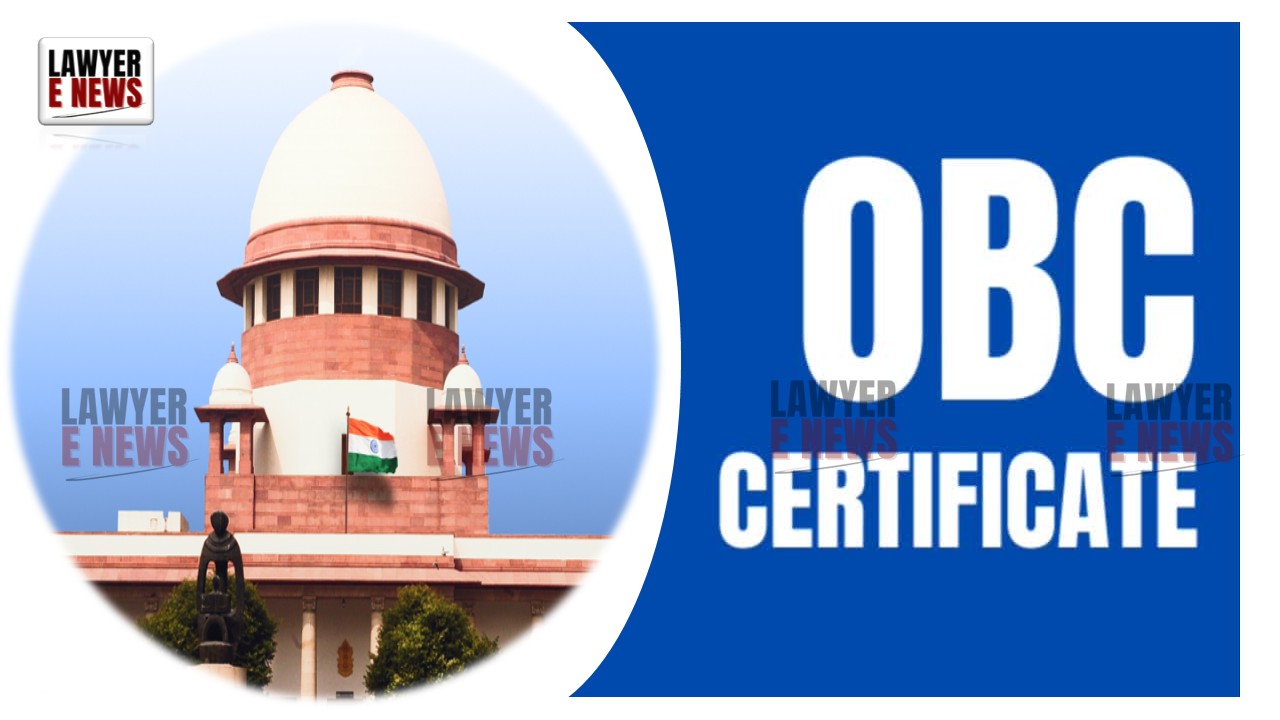-
by Admin
16 February 2026 1:47 PM



“If You Didn’t Have a Valid Category Certificate by the Application Deadline, You Can’t Claim
Reservation Later,” Rules Supreme Court While Dismissing Appeals by Judicial Service Aspirants
“You can’t use a certificate issued years ago to claim current eligibility — reserved category status is not a permanent tag, especially for OBC-NCL or EWS. The rules are clear, and the law stricter.”
In a crucial judgment that reinforces procedural rigour in recruitment, the Supreme Court of India on April 8, 2025, upheld the Rajasthan High Court’s decision disqualifying several reserved category aspirants from the 2021 Rajasthan Civil Judge Recruitment for not submitting valid caste or EWS certificates by the last date of application — 31.08.2021.
The Court, dismissing a batch of appeals led by Sakshi Arha, held that OBC-NCL and EWS certificates must be valid as on the last date of submission and not dated years before or months after, even if the candidates belong to the correct category.
“The Advertisement required a valid certificate in the prescribed format, and the subsequent notice only clarified what was already implied by law. You cannot claim rights beyond what rules allow.”
“You Knew the Law — Ignorance Is No Excuse. And the Law Is Clear: OBC, MBC, EWS
Certificates Must Be Recent and Verified.”
The appellants argued that the recruitment notification had no cut-off date for issuance of certificates and that they had cleared the preliminary and mains exams, so disqualifying them later was arbitrary. But the Court rejected this plea outright.
Justice Augustine George Masih, writing for the Bench also comprising Justices Abhay S. Oka and Ahsanuddin Amanullah, held that: “The Advertisement may not have mentioned the cut-off explicitly, but it referred to eligibility ‘as per rules’ — and the rules were clear that OBC-NCL and EWS certificates are valid for one year only.”
“Reserved Status Like OBC-NCL Is Not a Birthmark — It’s Dynamic and Must Be Freshly Verified”
The Court underscored the fundamental distinction between permanent categories like SC/ST, and dynamic categories like OBC-NCL or EWS, whose status changes with annual income and social status.
“Unlike SC/ST status, which is immutable by birth, the status of a candidate claiming OBC-NCL or EWS reservation must be proved at the time of application. Past certificates, even if genuine, are not sufficient.”
It cited circulars from the Rajasthan Social Justice Department (2015 and 2019), which stipulated that OBC-NCL certificates are valid for one year and may be extended to a maximum of three years with proper affidavits. None of the appellants met these conditions.
“You Can’t Ask for Relaxation When Rules Allow None — Being a Deserving Candidate Isn’t Enough”
The Court sympathised with the appellants’ efforts but made it clear that there can be no relaxation unless the rules themselves permit it.
“No clause in the Advertisement or Rules gave discretion to relax the cut-off. Courts cannot rewrite the eligibility conditions just to accommodate emotions.”
It also distinguished the appellants’ reliance on Ram Kumar Gijroya and other precedents, noting that those cases involved delays in issuing valid certificates — not old or expired ones submitted voluntarily.
“Candidates Must Be Vigilant — Public Employment Demands Adherence to Rules, Not
Hopes Based on Past Records”
The Court noted that none of the appellants had submitted a valid certificate issued before or on 31.08.2021, nor did they submit affidavits as per the state’s 3-year rule. In most cases, their certificates were either issued years earlier (e.g., 2016, 2018) or long after the cut-off date (mid-2022).
“You cannot cry foul when you didn’t follow the basic requirements of the application. You knew the rules — the law presumes knowledge of the law.”
“Public employment cannot be granted by emotion or chance. It is governed by law, and law demands strict compliance.”
Accordingly, the Court upheld the Rajasthan High Court’s rejection of their writ petitions and dismissed all civil appeals.
Date of Judgment: April 8, 2025
